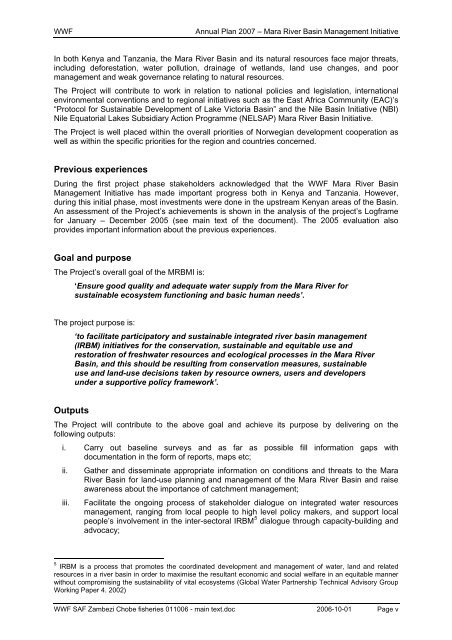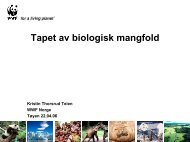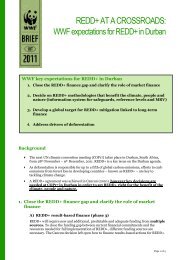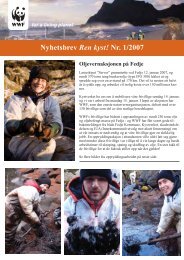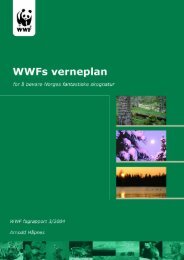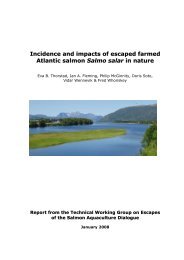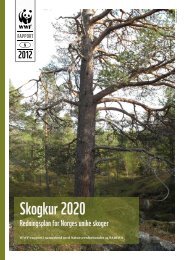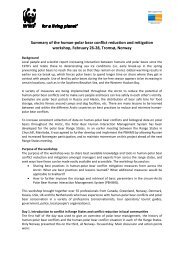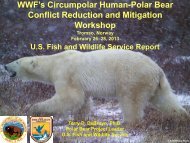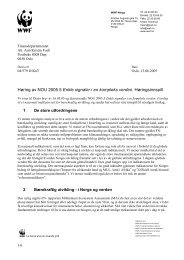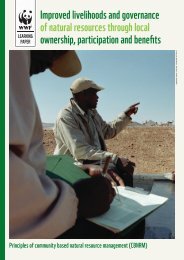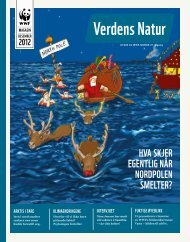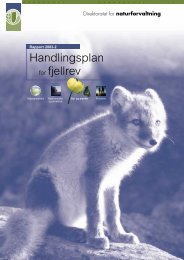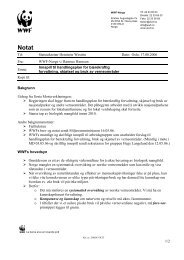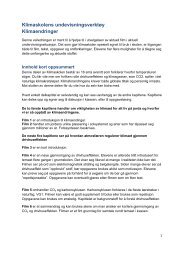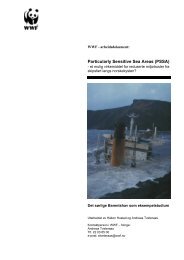WWF SAF Mara River Basin Project Proposal
WWF SAF Mara River Basin Project Proposal
WWF SAF Mara River Basin Project Proposal
You also want an ePaper? Increase the reach of your titles
YUMPU automatically turns print PDFs into web optimized ePapers that Google loves.
<strong>WWF</strong><br />
Annual Plan 2007 – <strong>Mara</strong> <strong>River</strong> <strong>Basin</strong> Management Initiative<br />
In both Kenya and Tanzania, the <strong>Mara</strong> <strong>River</strong> <strong>Basin</strong> and its natural resources face major threats,<br />
including deforestation, water pollution, drainage of wetlands, land use changes, and poor<br />
management and weak governance relating to natural resources.<br />
The <strong>Project</strong> will contribute to work in relation to national policies and legislation, international<br />
environmental conventions and to regional initiatives such as the East Africa Community (EAC)’s<br />
“Protocol for Sustainable Development of Lake Victoria <strong>Basin</strong>” and the Nile <strong>Basin</strong> Initiative (NBI)<br />
Nile Equatorial Lakes Subsidiary Action Programme (NELSAP) <strong>Mara</strong> <strong>River</strong> <strong>Basin</strong> Initiative.<br />
The <strong>Project</strong> is well placed within the overall priorities of Norwegian development cooperation as<br />
well as within the specific priorities for the region and countries concerned.<br />
Previous experiences<br />
During the first project phase stakeholders acknowledged that the <strong>WWF</strong> <strong>Mara</strong> <strong>River</strong> <strong>Basin</strong><br />
Management Initiative has made important progress both in Kenya and Tanzania. However,<br />
during this initial phase, most investments were done in the upstream Kenyan areas of the <strong>Basin</strong>.<br />
An assessment of the <strong>Project</strong>’s achievements is shown in the analysis of the project’s Logframe<br />
for January – December 2005 (see main text of the document). The 2005 evaluation also<br />
provides important information about the previous experiences.<br />
Goal and purpose<br />
The <strong>Project</strong>’s overall goal of the MRBMI is:<br />
‘Ensure good quality and adequate water supply from the <strong>Mara</strong> <strong>River</strong> for<br />
sustainable ecosystem functioning and basic human needs’.<br />
The project purpose is:<br />
‘to facilitate participatory and sustainable integrated river basin management<br />
(IRBM) initiatives for the conservation, sustainable and equitable use and<br />
restoration of freshwater resources and ecological processes in the <strong>Mara</strong> <strong>River</strong><br />
<strong>Basin</strong>, and this should be resulting from conservation measures, sustainable<br />
use and land-use decisions taken by resource owners, users and developers<br />
under a supportive policy framework’.<br />
Outputs<br />
The <strong>Project</strong> will contribute to the above goal and achieve its purpose by delivering on the<br />
following outputs:<br />
i. Carry out baseline surveys and as far as possible fill information gaps with<br />
documentation in the form of reports, maps etc;<br />
ii.<br />
iii.<br />
Gather and disseminate appropriate information on conditions and threats to the <strong>Mara</strong><br />
<strong>River</strong> <strong>Basin</strong> for land-use planning and management of the <strong>Mara</strong> <strong>River</strong> <strong>Basin</strong> and raise<br />
awareness about the importance of catchment management;<br />
Facilitate the ongoing process of stakeholder dialogue on integrated water resources<br />
management, ranging from local people to high level policy makers, and support local<br />
people’s involvement in the inter-sectoral IRBM 5 dialogue through capacity-building and<br />
advocacy;<br />
5 IRBM is a process that promotes the coordinated development and management of water, land and related<br />
resources in a river basin in order to maximise the resultant economic and social welfare in an equitable manner<br />
without compromising the sustainability of vital ecosystems (Global Water Partnership Technical Advisory Group<br />
Working Paper 4. 2002)<br />
<strong>WWF</strong> <strong>SAF</strong> Zambezi Chobe fisheries 011006 - main text.doc 2006-10-01 Page v


